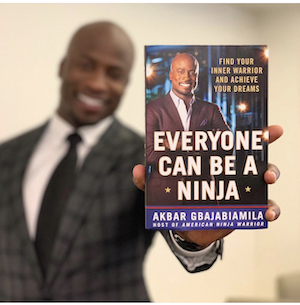Because He First Loved Us, We Can Face Almost Anything: Akbar Gbajabiamila and Kristian Stanfill
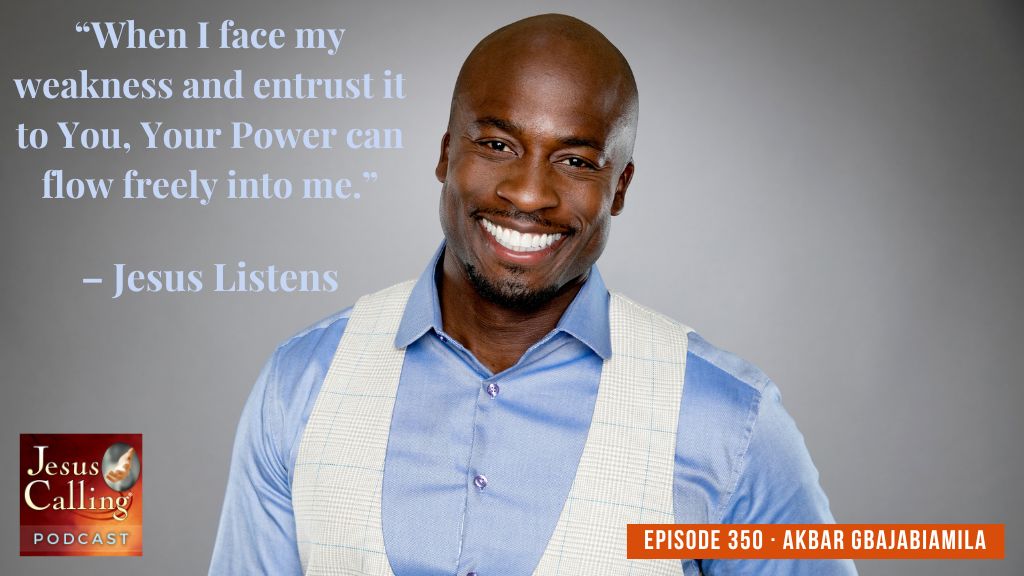
Akbar Gbajabiamila: I’m not just praying to God and saying, “Give me, give me, give me.” I’m giving thanks. I’m giving glory. I’m connecting. I’m reminding myself daily that I am a child of God.
Because He First Loved Us, We Can Face Almost Anything: Akbar Gbajabiamila and Kristian Stanfill – Episode #350
Narrator: Welcome to the Jesus Calling Podcast. There’s an element to having a relationship with God where you feel compelled to tell others about His love. Because when we’re in a loving relationship, we thrive. It brings us joy, and it gives us stamina to face whatever’s in front of us.
Our guests this week had circumstances in their lives that could have made their lives go in directions that might not have been optimal. Having God’s love as a foundation for how they saw themselves in the world was key to giving them that “push” they needed to believe they were made for something more.
Akbar Gbajabiamila is a former NFL player turned television host who almost didn’t take the leap of faith that led him to the career he has today, but it was advice from his father to finish what he started and to be an ambassador for God that motivated him to keep going. Kristian Stanfill is a worship leader of the Passion movement who vulnerably sought sobriety in order to overcome the tough emotions that he was burying and hiding from others.
Let’s start with Akbar’s story.
Akbar: I’m Akbar Gbajabiamila, host of American Ninja Warrior and CBS daytime talk show The Talk.
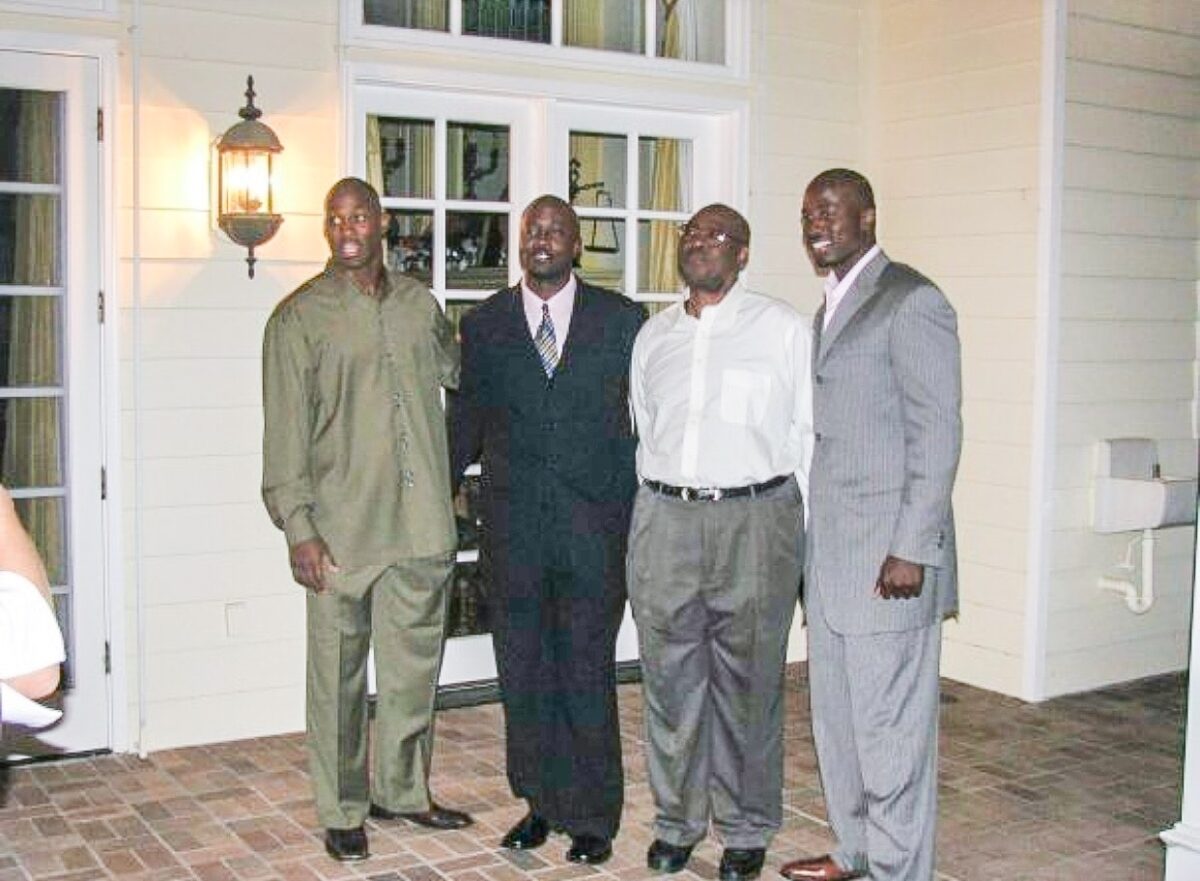
I grew up here in Los Angeles, California, and it was different for me growing up because I grew up in a predominantly African-American community. But my parents came to this country from Nigeria, and so I had two different worlds that I was living in. At home, I was living in this Nigerian-American world. But when I got to school, I was just living in this African-American world, but mostly just from the American perspective. And so there wasn’t a lot of appreciation for our cultural differences. I didn’t have a lot of the same similarities as my friends did at school.
Did we get made fun of? I mean, it was relentless teasing. You get a name like Akbar Gbajabiamila, then you get the Nigerian clothes when everybody’s wearing Jordans and the coolest Nike shirts. And so as you can imagine, I felt like an outcast. I felt like an outsider. But I had to learn how to persevere. But I remember something that my father told me, and I never forgot this: “Make them say your name, make them say your name.” When you make them say your name, whenever they say your name, it should be in a favorable light. You’re doing things that people are going to remember you by.
“I felt like an outcast. I felt like an outsider. But I had to learn how to persevere. I remember something that my father told me, and I never forgot this: ‘Make them say your name.’ Whenever they say your name, it should be in a favorable light. You’re doing things that people are going to remember you by.” – Akbar Gbajabiamila
Akbar’s Early Dreams Around Sports
Growing up in Los Angeles, you had to be a Laker’s fan. Yes, the Clippers played in Los Angeles, but there was no other team but the Los Angeles Lakers. I grew up during the Showtime era and it was Earvin ‘Magic’ Johnson and the captain, Kareem Abdul-Jabbar. I grew up watching the Lakers and they would come on the local station, KCAL9, and I would sit and watch them. And the Showtime era was just so fun and fast and exciting. And I was like, This is what I want to do. I want to play basketball.
It was my first love. You would see me going to school, I’d be dribbling basketball. And fast forward to preparing for high school, I was never the best player. I was clumsy. Kids, they picked me last, and they were winning championships, had more championships than any high school in the country. So making Crenshaw High School basketball was like making the junior Lakers, like, I had to. This had to happen.
And I remember when I made it, I was crying. I was like What? I made it on the JV squad. But while I was going through my basketball journey, my high school football coach saw me on campus once I made it to high school, and was like, “You should play football.” So after years of harassing me, I decided, All right, I’m going to play football.
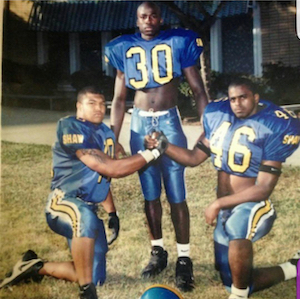
And I remember the first day of football practice, I cried underneath my helmet. I had bruises and bumps. This is barbaric. I don’t want to play this anymore. And so I quit. And my coach called my dad. I come home and my dad says, “You did what? You quit? You start it, you finish it.” And I was like, “Oh.” So I had to go back. And he said, “You don’t play, then you can’t play basketball.” So of course, I decided that I was going to play both football and basketball.
I started to see success my senior year in high school in football. My first year playing football, I was just walking into sacks. I didn’t know what I was doing on the football field. I just knew, A gap, B gap, and C gap. That’s all I knew. And I got five scholarship offers in football and zero scholarship offers in basketball.
Sometimes You Have No Idea, But God Does
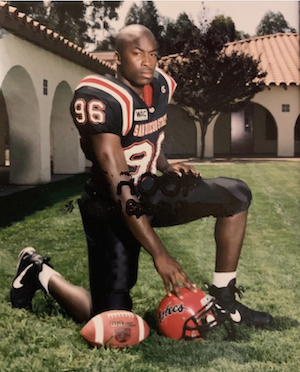
What’s the story here? The story is sometimes you have no idea. You have your mind set on something else, and sometimes others see something special in you that you can’t see in yourself. I had no idea that my coach was calling it, and it reminds me of how the Lord calls on other people. And sometimes you ignore that voice. And I was ignoring that voice until my dad made me stay in there and listen to the voice. And that would then give me a scholarship to play at San Diego State.
“What’s the story here? The story is sometimes you have no idea. You have your mind set on something else, and sometimes others see something special in you that you can’t see in yourself.” – Akbar Gbajabiamila
My mom and dad met as Muslims. My mom converted to Christianity and so raising us up, we grew up in a dual religious household. They raised us in a dual religious household where we would go to church, we would go to the mosque. My dad would pray in Arabic. My mom would pray in English from the Bible. It was love. It was all peace.
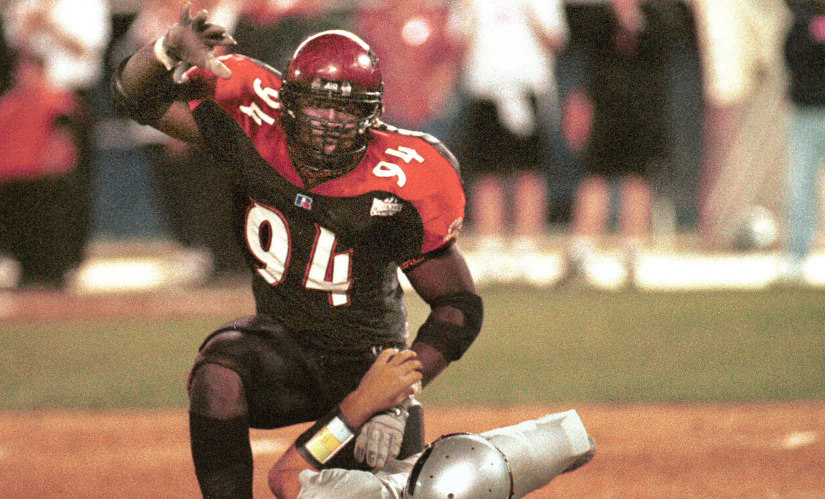
I went to San Diego State, and there were about four Muslims on the team and we would do Ramadan together. And I was surrounded with a lot of Christian men in the locker room. And so this is when you’re not under the direction of your parents anymore. You’re kind of growing into your own. You’re trying to figure out who you are as a person.
But I think just being around my mom, the stuff that she instilled in us started to flood up as I was having conversation with my peers. I remember after my freshman year, I just said, “You know what? I’m not Muslim, I’m not Christian. I’m just a believer in God,” and I just wanted God. At that time I felt like it was God putting it on my heart, like I needed to strip identity and all this other stuff so God could work in me. All the stuff that I got from my dad, all the stuff that I got from my mom.
And so of course, there’s a reservation inside of me. I found a person who was just like me, Pastor Miles McPherson from the Rock Church. He’s African-American, he was a football player. But he grew up similar to the way I grew up—wasn’t Nigerian, but it didn’t matter. But he spoke the language that I spoke, and he also was very relatable. But more than anything, I had realized I had never really been taught the Bible. I was just saying, “You got to do this. You’ve got to go here. You got to go to church, you got to do this, you got to do that.” And I wasn’t really taught. And so he started to teach me. As I started to learn, my relationship with Christ got better.
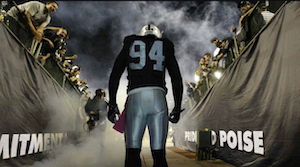
Going back to my football days, the better you understand the playbook, the more comfortable you are on the football field. And this is how God was starting to work in my life. As I started to become taught, I started seeing the Lord ordering my step in a certain way. And that right there was the beginning of my journey as a Christian.
“The better you understand the playbook, the more comfortable you are on the football field. And this is how God was starting to work in my life. As I started to become taught, I started seeing the Lord ordering my step in a certain way. And that right there was the beginning of my journey as a Christian.” – Akbar Gbajabiamila
Forging Your Own Way in the World
During my time at San Diego State, my dad always prepared us, obviously, to be focused on what you’re doing at the time with school and sports. I was a student athlete, but there was something that really drew me in as a young kid. Oprah Winfrey would come on at 3:00, and there was something about Oprah Winfrey that just spoke to me. I loved Oprah Winfrey. So by the time I got to San Diego State, they asked me, “What did you want to major in?” I said, “Communications,” but all of the advisers wanted me to be a criminal justice major. I was like, “That’s not for me.”
I wasn’t a big name NFL star. I was very proud of my accomplishments making it to the NFL, but I didn’t create a name. And so the challenge was, as I was leaving the NFL and transitioning, you saw that TV was only meant for the big name, the guys who played in the playoffs and the Super Bowl. These were the guys getting the big TV jobs. And I thought to myself, How do I get in? How do I find an opportunity? All I’ve done is play sports. That’s all I’ve done for my entire life at that point. And I thought, How am I going to do this? So I had to kind of sit for a while, and I prayed, I prayed, I prayed.
One day I’m sitting in my townhome in San Diego and I just got up and I go, “You know what? I’m going to go to the local NBC station and I’m going to tell them that I’d like to work for them.” I knock on the door unannounced. Nobody knows I’m coming midday, and I say, “Hey, my name is Akbar. I would love to do the post-game show for the Chargers and for the Aztecs. I would love to have this opportunity to do this job, but I’ll do it for free.” And I just remember the look on his face, like, “For free? Yeah, of course you can. Done.”
It took me about five years before I kind of broke onto the scene, but in between there, I almost gave up. And I remember my father saying, “If you start it, you finish it.” And about three years into my broadcast journey, I wasn’t making a lot of money. I was really struggling. I was starting to lose the money that I had saved up from the NFL, and I’m going, Wait a second, maybe I’m living a pipe dream. Maybe this isn’t reality for me. Maybe this isn’t going to happen.
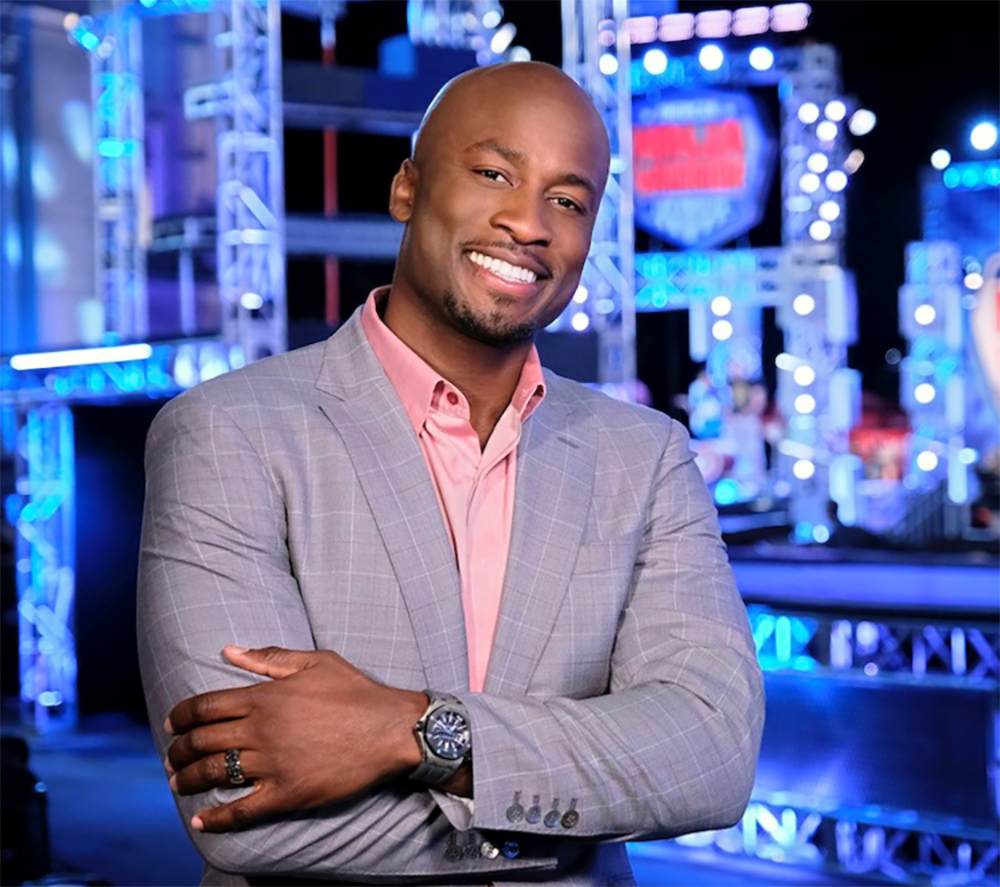
My wife was getting frustrated with my dream and with my journey. And I remember going out for an audition for the NFL Network, and I didn’t tell her. I went over to this audition and boy, I was going up against some big football names. You wouldn’t pick me out of this group at all. You’ve got a guy who doesn’t have a chance. He might as well go home. And the Lord would have it that that day I’d be able to get the job. And it changed everything. It changed the trajectory of my broadcast career.
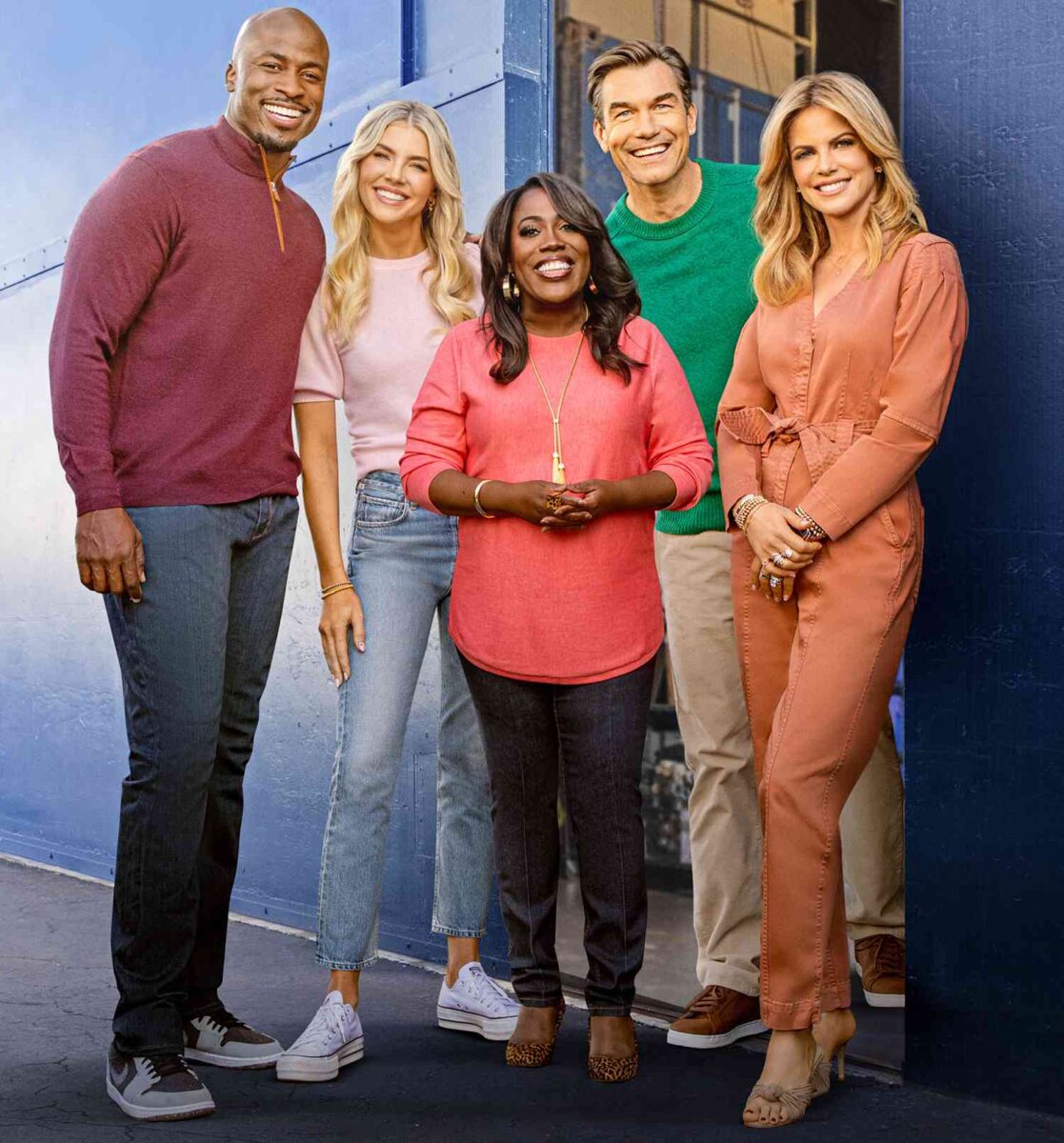
It would later pay off because now I’m hosting American Ninja Warrior. I’m hosting a daytime talk show (Thank you, Oprah) on CBS called The Talk. And I’ve just started hosting my new show now on Roku, which is Fight to Survive. And, you know, I would have never thought back as a young kid from south Los Angeles that I would end up having three shows. The point of that story is that sometimes you do have to create your own opportunities. Sometimes you have to step in faith, and sometimes it looks scary. My father used to say, “You’re an ambassador for the family, and you’re an ambassador for God.” And I never, ever, ever forgot that.
“The point of that story is that sometimes you do have to create your own opportunities. Sometimes you have to step in faith, and sometimes it looks scary. My father used to say, ‘You’re an ambassador for the family, and you’re an ambassador for God.’ And I never, ever, ever forgot that.” – Akbar Gbajabiamila
Jesus Listens, April 29th:
Glorious Jesus,
Help me to lay down my problems long enough to gaze at You. Sometimes I picture myself standing at the edge of a magnificent ocean, on a beach covered with pebbles. The pebbles represent problems—mine, my family’s, my friends’, the world’s. When I pick up these small stones and hold them close to my eyes, examining their details, my view of the grandeur all around me is blocked.
The ocean represents You—endlessly glorious and continually present with me. I want to put down all the pebbles so I can experience Your loving Presence. As I wait with You, I can almost hear You whispering: “Choose Me, beloved. Choose to see Me—to find Me—in your moments.”
In Your exquisite Name,
Amen
Narrator: To learn more about Akbar, follow him on social media, and be sure to check out his book, Everyone Can Be a Ninja: Find Your Inner Warrior and Achieve Your Dreams, at your favorite retailer.
Stay tuned to Kristian Stanfill’s story after a brief message.
Jesus Calling for Easter
The Easter season is filled with joy and hope. Now there’s a new way to focus on the holiday with Jesus Calling for Easter! With 50 Jesus Calling devotions selected just for the Lent and Easter season, Jesus Calling for Easter includes scripture verses alongside breathtaking imagery and exquisite design. Jesus Calling for Easter makes a stunning gift for those who love Jesus Calling and would like a new way to observe the Easter season. To learn more about this beautiful edition of Jesus Calling, please visit jesuscalling.com/books.
Our next guest is a Christian worship leader and songwriter who has written and performed countless inspiring songs about God’s love. Kristian Stanfill is a worship leader at Passion City Church and is a leader within the Passion movement. He shares how behind the veneer of shiny guitars and well-placed vocals, he was masking his emotions with alcohol.
Kristian Stanfill: My name is Kristian Stanfill. I’m a worship leader with Passion conferences. I grew up here in Atlanta, Georgia, a suburb of Atlanta called Marietta.
When I was a kid, I loved music. I was obsessed with music, and I picked up a guitar when I was about twelve or thirteen, started trying to figure it out, starting to write songs. I would say that it was my number one passion, but I had no idea that it could be a profession or something that I could do with my life, that really wasn’t a well-worn track or path when I was growing up.
Seeing God Spark Revival

I started leading worship in my middle school youth group when I was in seventh grade, eighth grade. And it was not very good. It was very bad. Me and a few other people were in a band and, you know, we were thirteen/fourteen years old trying to figure out how to play music together. So it was pretty rough. But we saw God do some really incredible things, and that started my journey into writing worship songs, leading worship.
We started to see just this massive influx of students coming into our ministry, people giving their lives to Jesus. It was very real. And I think that’s when God really called me in that season of my life. It kind of got its hooks in me and I thought, Man, if I could be a part of helping people see Jesus and encounter the presence of God with my life, that would be pretty cool.
We had a youth pastor who really took us under his wing and helped us understand that we needed to rehearse and practice as a band. He encouraged us to write songs and then he would give us opportunities to lead every Wednesday night and even sometimes on Sundays in the adult gatherings, he would ask us to lead worship. And so he created a space that was safe for us to grow musically and also spiritually.
“I thought, Man, if I could be a part of helping people see Jesus and encounter the presence of God with my life, that would be pretty cool.” – Kristian Stanfill
And we actually made a little recording. We made a little CD, which funny enough was mostly Passion songs. We were just starting to hear rumors of what God was doing through Passion. And so we got into this little studio in Alabama and recorded this ten song CD called Just Worship. Looking back on it now, you might say, “Oh, that’s pretty raw.” But at the time, it was a very true offering of worship. And so those were the real formative days for us.
Pretending It’s All Okay
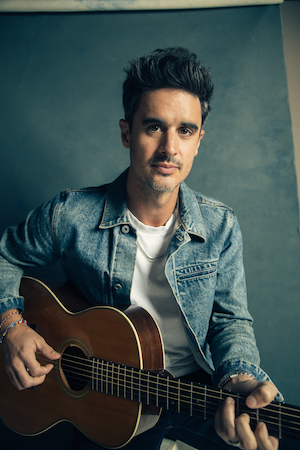
You know, there were large chunks of time, especially in the last seven or eight years, that I just pretended like everything was okay, and no one was telling me to do that. I didn’t feel any pressure to do that. Now, certainly, you know, social media makes you think you have to have your life together all the time. But there wasn’t anybody who was telling me like, “Hey, you just need to put a face on and suck it up.” But what the last couple of years has taught me is that it’s okay to be honest moment by moment and be true to what’s going on right here and now.
For me, you know, alcohol became something that I used to numb these feelings of inadequacy or failure or I’m not good enough or I’m not measuring up. And I think we all feel similar emotions and similar things, and we all live in the same world and feel a lot of the same pressure. I just wasn’t dealing with it in a healthy way.
“Alcohol became something that I used to numb these feelings of inadequacy or failure or I’m not good enough or I’m not measuring up. And I think we all feel similar emotions and similar things, and we all live in the same world and feel a lot of the same pressure. I just wasn’t dealing with it in a healthy way.” – Kristian Stanfill
I was running from it. I didn’t want to face any of that. I didn’t want to figure out what was at the bottom of those emotions or those feelings. And it all kind of came to a breaking point at the end of 2020. Things are a little bit quiet and still for the most part, and you’re forced to take a look in the mirror and go, Wow, there are some things about my life that I need to look at and address.
My wife, my Pastor Louie Giglio, and his wife Shelly, some counselors, we all got involved and started the really hard work of excavating, like emotional excavating, getting down below the surface. You know, there’s the topical issue of alcohol, but like, what is the thing way down deep that’s causing the drinking? What am I running from?
That is one of the more emotional parts of the story for me because what I expected when my wife finally knew what was really going on, when my friends finally knew what was going on, when my pastor knew, what I expected would happen [was that] the hammer would drop and the Book of Judgment would be opened and there would just be this verdict of, “You are filthy, you are not worthy, get out of the community.”

But to be honest, I got the opposite. I just got open arms and grace and love. Now, there’s a lot of hurt. It’s still been hard. There’s definitely consequences when it comes to sin. And there’s some things about my life that have changed professionally and personally because of the last two years. But I would say that the first step that everybody took was toward me and not away from me.
“The first step that everybody took was toward me and not away from me.” – Kristian Stanfill
Understanding the Love God & Others Have for You
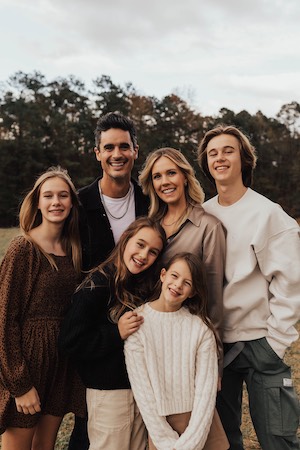
I think people are used to hearing church songs or worship songs from me or from Passion. It’s been really cool to release Make It Out Alive.
This record is more of a human, vulnerable, honest, authentic. Like, let me just show you what’s really going on, kind of a project. These songs started as really they were kind of journal entries, just conversations with God and conversations with my own soul, just processing the moment of life that I was in, that my family was in.
I started to meet a lot of other people that were in a similar stage of life that I was in, and everybody felt like they were on an island. Everybody felt like they were isolated or alone in their brokenness or in their struggle or whatever they were battling day to day. And so I started to really pray. That’s where it started. And then I just started to get to work.
And that process grew into the record that is Make It Out Alive. It’s very honest, very personal. I lived every lyric on this project, but I think it’s a universal message.
It’s a human message that we don’t have to pretend, we don’t have to project an image when we come to God, when we come to other people. We can take our mask off and be who we really are.
And now, here we are two plus years later. And to be honest, I’m still in process with some of that stuff. But I started to understand things about my life. God started to help me understand things about who He is and His love for me. I started to understand my community’s love for me, and it was just transformative.
“God started to help me understand things about who He is and His love for me. I started to understand my community’s love for me, and it was just transformative.” – Kristian Stanfill
I still feel those feelings sometimes, Am I good enough? Am I failing at everything? I’m inadequate. I still feel a lot of that stuff. The difference is now—like I was saying before—I’m learning to be aware of it and I’m learning to deal with it in a healthy way, which is to bring it to my community and go, “Hey, here’s where I’m at today. I need prayer. I just need somebody to know what’s going on.”

We definitely are on higher ground and the light is shining on us all. And now we have this incredible story to tell of God’s mercy and God’s grace and God’s healing power. I’ve grown up hearing about grace and God’s love. But you have to understand that it’s real for yourself and that God’s grace flows down into the deep, dark place that you’re at and meets you there, but it doesn’t leave you there. It changes you. It transforms you.
“I’ve grown up hearing about grace and God’s love. But you have to understand that it’s real for yourself and that God’s grace flows down into the deep, dark place that you’re at and meets you there, but it doesn’t leave you there. It changes you. It transforms you.” – Kristian Stanfill
Turning to Others for Accountability
What I’ve learned is that He was right there by my side, hand on my back the whole time, going, “I love you. I’m here. I’m with you. I’m not going anywhere. Even at your worst, I’m right here. Even when you think you did a good job, I’m right here.” So that’s kind of how I see it now. It’s more of a human, real relationship as opposed to more glasses on the end of your nose, you know, kind of look, staring out from the distance, like, “How are you going to do today?”
You know, vulnerability is not the end of the process. It’s not vulnerability for vulnerability’s sake. That’s not really the goal. The goal here is that we would be more like Christ and God uses these things in our life, even these broken things, these struggles that we go through, to refine us and make us more like Himself. I tell people this all the time, I say, “Lean into it. I know it’s hard. I know that it hurts. It’s painful to uproot this stuff in your life. But this is a gift from God.” It’s hard to see it that way. It was hard for me to see it that way at the end of 2020.
“God uses these things in our life, even these broken things, these struggles that we go through, to refine us and make us more like Himself.” – Kristian Stanfill
I literally thought this could just be the end of every good thing in my life. But now I can look back on it and see that it was one of God’s greatest gifts to me was to let me go through what we went through. There was a sanctification process that happens in there. Things get broken off of you that need to be broken off of you. God chips away, and coming through it on the other side, you are made more into the likeness of His Son. And that is the goal.

If you want a resurrection, then a dying has to happen. But this death is not the end. It’s where your life begins. I will be in process for the rest of my life until I meet Jesus face to face. I will be in process. I will be continuing to grow and become more like Him. That’s just an endless process, but it’s a beautiful process.
“If you want a resurrection, then a dying has to happen. But this death is not the end. It’s where your life begins.”- Kristian Stanfill
Narrator: Kristian closes this episode with a reading from Jesus Listens, February 15th.
Kristian:
My Shepherd,
I love to hear Your whisper in my heart: “I am taking care of you, My child.” Sometimes I feel alone and vulnerable— exposed to the elements of this fallen world. When I’m feeling this way, I need to stop and remind myself that You care for me. This promise reassures me and draws me closer to You. As I relax in Your Presence, I quit trying to figure out the future and orchestrate what will happen.
I will fear no evil, for You are with me.
In Your vigilant Name, Jesus,
Amen
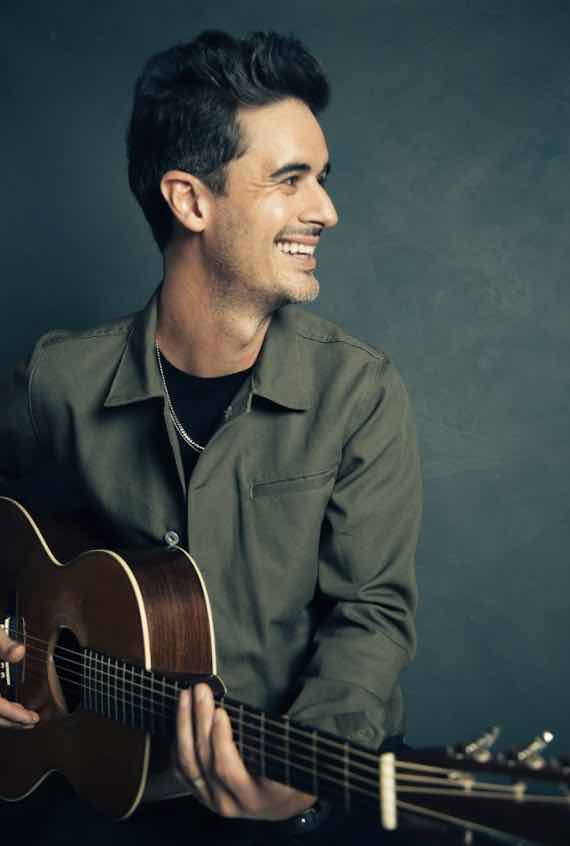
Narrator: To learn more about Kristian, please visit www.kristianstanfill.com. Be sure to check out his album Make It Out Alive, and Passion’s new album I’ve Witnessed It, wherever you get your music.
If you’d like to hear more stories, check out a special bonus episode of the Jesus Calling Podcast, featuring multiple guests talking about the empowering foundation of God’s love.
Next Week: Aaron Tippin
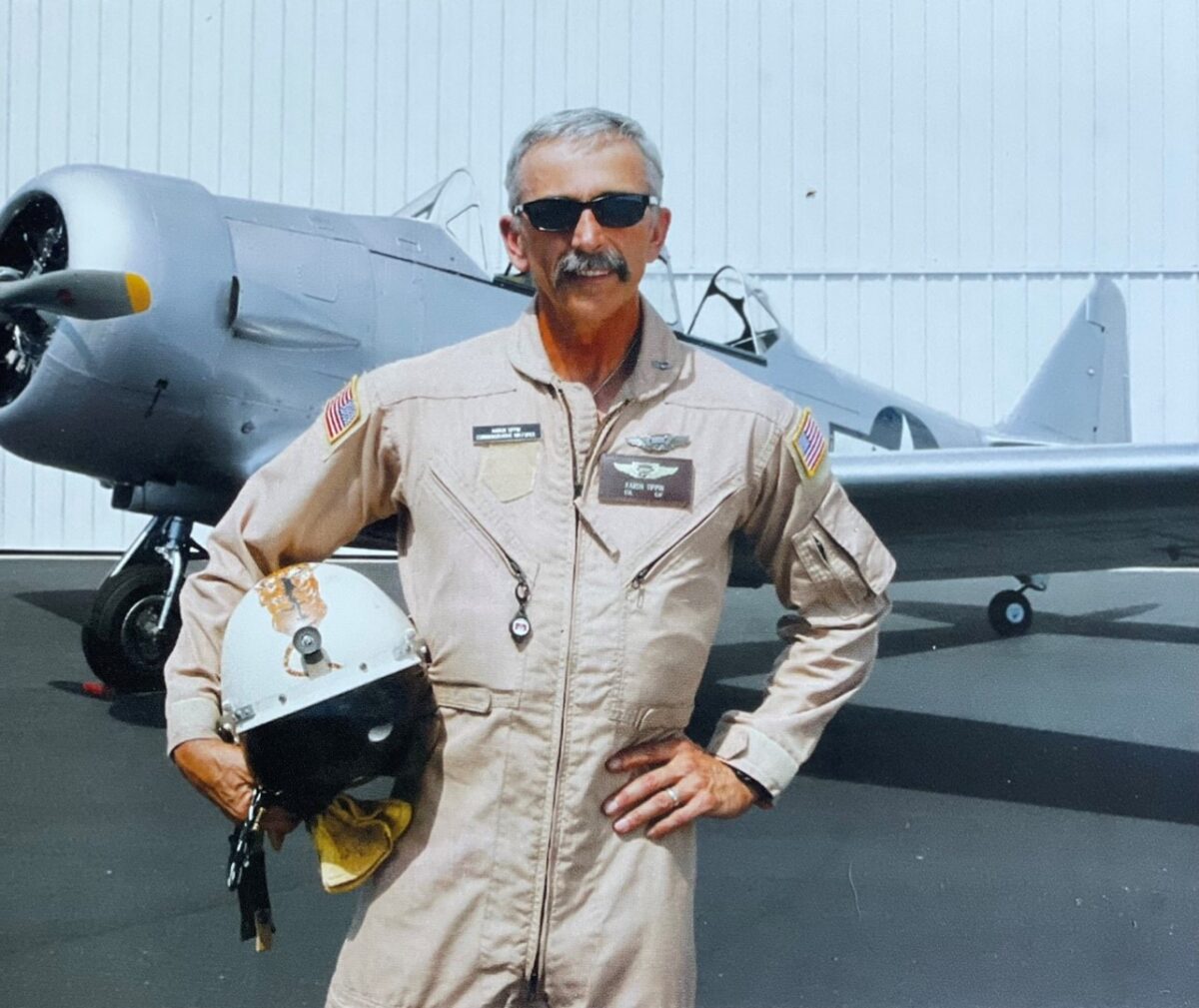
Next time on the Jesus Calling Podcast, we hear from a country music crooner and songwriter, Aaron Tippin, He describes the moments when he feels God’s presence most acutely—when he is flying an airplane.
Aaron Tippin: I think when I am flying an airplane, I am truly closer to Him. I always think about me flying some of the coolest things and getting to see God’s earth, one of God’s creatures. And I’m just flying along and a bald eagle looks over at me. Just keep going by it. So it is getting closer to heaven.
